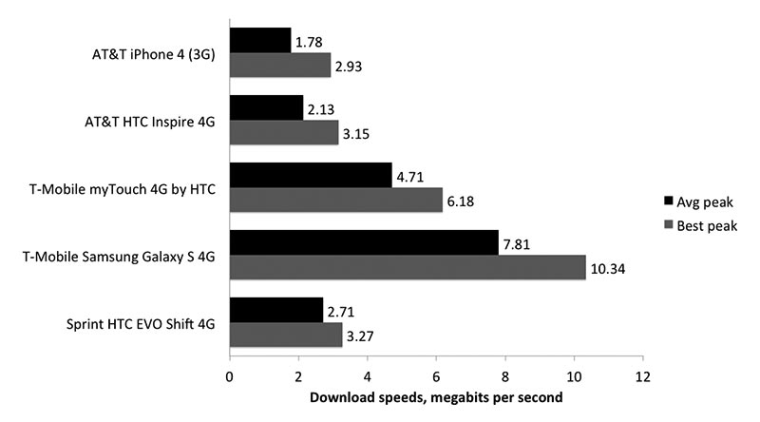We got the chance to test T-Mobile's newest, fastest phone, the Galaxy S 4G, and decided to see how fast some other top 4G-labeled phones were. It turns out, not all 4G is equal.
AT&T, Sprint and T-Mobile have 4G phones on the market, and Verizon Wireless is launching a bunch this year too. But the "4G" term doesn't denote any particular technology or performance level. All will have different performance — it's really just a marketing push.
So at this very early stage, we decided to learn what we could. In addition to the T-Mobile Galaxy S 4G, we grabbed T-Mobile's myTouch 4G, Sprint's HTC Evo Shift 4G and AT&T's HTC Inspire 4G. As a yardstick, we also tested the best selling phone in the U.S., the AT&T iPhone 4, which runs on a 3G network.
It may shock you to discover that the phones themselves have different speed ratings, but that's precisely the point: They're all emblazoned with the same "4G" nonsense, all the while they aren't even capable of delivering the same download speeds, not even the same orders of magnitude. (Upload speeds are kept much lower, on purpose.)
If you dig into carrier websites, you'll learn that Sprint and AT&T currently promise download speeds of up to 6 megabits per second. T-Mobile marketing is more aggressive: The myTouch 4G has a "theoretical" peak of 14.4 Mbps, and the Galaxy S 4G peaks at 21 Mbps, at least on paper.
Verizon is a wild card — when I tested its 4G LTE network using a laptop, I got a cable-modem-busting 33 Mbps, but that's not likely to ever be repeated, especially on a phone. Verizon's party line is "5 to 12 Mbps," but since Big Red currently has no 4G phone on the market, or even one available to test, they're not shown here.
Methodology
The fastest and best way to test a phone's network performance is to run the Speedtest.net app. It's available free for iPhone and Android through their app stores, and uses a network of local servers to guarantee that the tests reflect the phone's connectivity, and not other factors. Though our video was shot in one location where all the phones consistently more than half of their bars, we continued to test the phones through the day, looking for a collection of peak speeds. After all, ours was not a test of a network's reliability or consistency. It was a test of pure download speed — the more extreme the better.
I want to stress that this isn't a scientific test. Network performance can be affected by time of day, distance from towers and number of users in a given area, not to mention factors way beyond your control, such as the ability of the carrier to ferry its users' data to and from the Internet.
This is, however, a summary of typical real-world experiences. If you buy any of these phones, you might do better, but you should not expect more, at least in the short term, before carriers can build out their networks.
Results
As you can see from the chart, results consistently favored T-Mobile, despite similarly decent network coverage by AT&T and Sprint.

Only one phone delivered anything you could really call "extreme." The Galaxy S 4G topped 10 megabits per second in a few separate tests, and scored a peak average of nearly 8 Mbps. T-Mo's other model, the myTouch 4G, did pretty well too, handily beating competitors.
The iPhone 4 was never intended to come out on top; in fact, as a 3G phone, it would have been weird if it had finished anywhere but in last place. (The Verizon iPhone 4 is not any faster, in case you were wondering. Verizon's 3G network is, for technical reasons, slower than AT&T's.)
Despite losing, the iPhone did manage to shame the Sprint and AT&T 4G phones, which only managed to outperform it by a smidgen. It was sad that neither phone ever came near touching the 6 Mbps ceiling promised "in limited areas" by the carriers. After all, the phones themselves clearly indicated that we had 4G coverage.
A learning experience
The purpose of this is not to tell you which phone to buy, though that Galaxy S 4G is looking pretty awesome. No, the point is to make sure you don't get sucked in by the 4G sales pitch without some hard numbers.
Results vary from square foot to square foot, so go into the store, and demand a Speed Test reading. When you buy the phone, within your two-week buyer's remorse period, go everywhere and run as many tests as you can. If you're not seeing speeds that justify the cost of your shiny new handset, take it back.
Carriers can't work magic — radio-based technologies always have weaknesses, and some carriers just happen to work better than others at any given spot on the map. But if they're promoting 4G as twice as fast, four times as fast, even 10 times as fast, you should hold them to it, and not just take their smiley salesman word for it.
More stories about 4G by Wilson:
- Phone buyer beware: 4G may not be for you
- Test: Verizon 4G wireless beat cable broadband
- Verizon launching 10 4G devices: tablets, phones and notebooks
- T-Mobile goes 4G tablet crazy with LG G-Slate, Dell Streak 7
Catch up with Wilson on Twitter at — he may be the only person alive who actually wants to hear about your own 4G speed tests — or join our conversation on the .